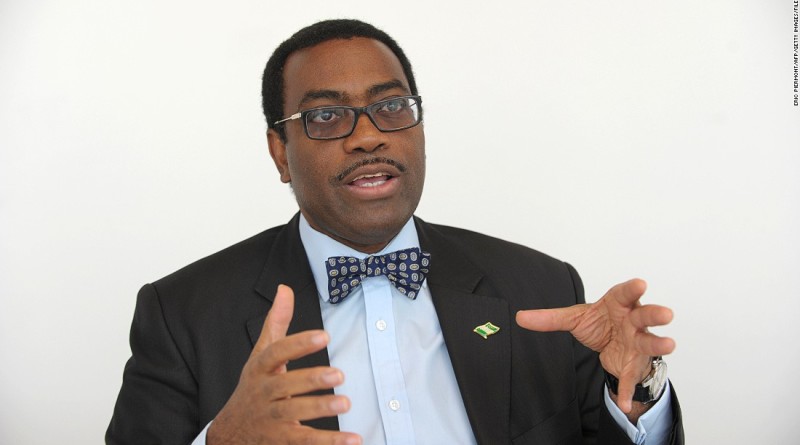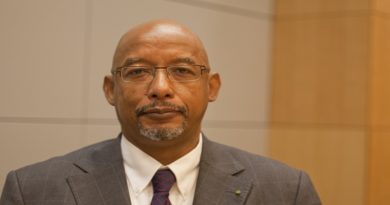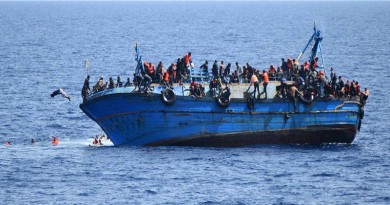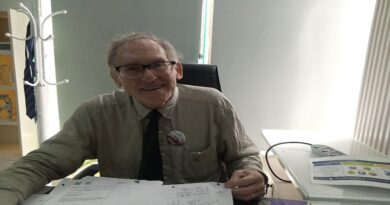We’re tired of being in the dark – Akinwumi Adesina, AfDB President
Africa Development Bank (AfDB) president, Akinwumi Adesina wants to use the bank to de-risk investments in electricity and agriculture and so help transform the continent’s economies.
Akinwumi Adesina has risen from being a developmental economist specialised in agricultural finance to agriculture minister of Nigeria, and then to president of the African Development Bank (AfDB) in September 2015. His signature policy as minister was the reform of a fertiliser subsidy, and he injected fresh energy into Nigeria’s green revolution. He is a strategic ally for those who believe Africa’s competitive advantage lies in boosting its agricultural output, given his mantra of “agriculture is a business.”
Insiders within the AfDB welcome the new man at the helm. According to one source, who requested anonymity: “He says he wants to be surrounded by the smartest people so that they can shoot down his bad ideas and make his good ones great.” Adesina has also wielded the axe faster than previous AfDB presidents, and three vice-presidents stepped down at the end of January.
Whether he will prove the shot in the arm that the institution needs remains to be seen. What is certain is that many African countries are facing a tough year: from currency collapses to drought and rock-bottom commodity prices.
The Africa Report: How do you think El Niño is going to affect the farmers of Africa? What can the bank do to mitigate those effects?
There has to be rapidly disbursed funds to allow Africa to adapt very quickly. Climate change impact for us is not in the future, it’s now. I think there are two ways in which this can be done. First and foremost is for the Green Climate Fund and the Global Environmental Facility to actually put aside some money rapidly to allow countries to insure themselves against this kind of environmental shock. The problem is: who pays for insurance? The global community needs to rally around African countries and help them to pay for the insurance through the African Risk Capacity. That will then pay out massive amounts of money to deal with [the effects of El Niño]. The second [way] is [through] individual insurance for farmers, both in terms of livestock insurance and crop insurance – weather index insurance.
The Ethiopian government says it is not opening up markets to foreign banks because they are not interested in financing small and medium-sized enterprises (SMEs). Are they right?
The point I want to make out of that concerns what [Prime Minister Hailemariam Desalegn] says about the SMEs. Today, roughly about 90% of all the businesses you find in Africa are SMEs. For African economies to be more robust, we need to get a lot more financing to them. That is why, at the AfDB, we have continued to make a lot of financing available to them. We provided $1bn of financing to SMEs for trade finance in the last two years. We’ve provided a lot of money to intermediary financial institutions in various countries to be able to on-lend at a lower rate of interest to SMEs.
The main challenge facing many SMEs – I would not even put finance at the top of [the list] of their challenges – is a lack of electricity, a lack of energy. Most of them are running on diesel generators, and therefore the cost of doing business for them is high.
We are launching this new deal on energy for Africa to allow Africa to be able to electrify itself completely within 10 years. It makes no sense that Africa continues to be in the dark, and we’ve said we’re tired of being in the dark. That’s why as a bank we are going to invest $12bn in the next five years in the energy sector. We also hope to use different types of instruments to de-risk the energy sector, to be able to leverage anything between $45bn and $50bn into the sector.
There is this ongoing conversation about how open an economy should be at a particular point in its development…
Countries and regions at different stages of development use a different mix of trade policy, financial policy and industrial policy. There’s no one cookie-cutter model to development. If you take a look at Asia, all of [the countries] did different mixes of those policies based on what they wanted to do.
At the AfDB, our focus is really on an open African market without borders. It’s the best that can happen to this continent. If you take a look at the Common Market for Eastern and Southern Africa, the East African Community and the Southern African Development Community – which plan to open up their markets to each other – it’s about 630 or so million people, right? We’re talking about a trillion-dollar gross domestic product among the 26 countries that are involved.
You can imagine if you do that at a wider scale. What that means is that you will have industrial growth engines in different parts of Africa that will produce and specialise and be able to sell in different parts of Africa. Secondly, you will also see that Africa’s exposure to global volatilities on the commodity markets will fall because you are trading a lot more within yourself than you are trading on the outside. Thirdly, it will speed up the financial market integration of Africa because they have to actually sell goods and services all across the continent.
With weak commodity prices and African currencies losing value, will the bank play a countercyclical role?
The bank is already doing that in two ways. First, we are providing direct budget support to provide counter-cyclical financial support to countries. The bank is also supporting countries with balance of payments deficits to be able to smooth that [out]. In addition, the bank will continue to provide technical assistance for countries in terms of better macroeconomic management but also fiscal consolidation. When you are subjected to external shocks, you require a bank like us to actually be with [you] and support [you]. But, as I said, a crisis is always a terrible opportunity to miss. We must look in there and see what needs to change. And what needs to change is more rapid diversification of African economies.
The Africa Report




